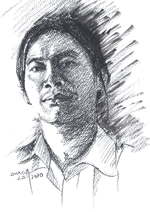
COMMENTARY
| By AUNG ZAW | Wednesday, April 27, 2011 |
After nearly 50 years of military rule and countless efforts to restore democracy by every means imaginable, Burma has become a land where hope springs eternal, but caution rules the day. And so the appointment of Derek Mitchell as the first ever US special envoy to Burma has been greeted by veterans of the country's democratic struggle as an occasion for guarded optimism.
In his current position as Principal Deputy Assistant Secretary of Defense for Asian and Pacific Security Affairs at the US Department of Defense, Mitchell is no stranger to Burma. He has followed the country's affairs closely and in the past met with leading dissidents, including Aung San Suu Kyi.
 |
| Aung Zaw is founder and editor of the Irrawaddy magazine. He can be reached at [email protected]. |
Perhaps adding to Suu Kyi's muted sense of expectation is the fact that Burma is already undergoing a “democratic transition” initiated by the ruling junta. But these changes, which are entirely cosmetic, are aimed not at moving the country forward, but at keeping the current rulers firmly in control.
As long as the regime can keep up its pretense of engaging in political reforms, it is unlikely to listen to those calling for more fundamental change. One of Mitchell's first tasks, then, must be to let the generals know that they aren't fooling anybody with their parliamentary masquerade party in Naypyidaw.
Meanwhile, Suu Kyi knows that it is her role to encourage the efforts of anyone genuinely interested in helping Burma to emerge from half a century of regressive rule. Not really knowing what approach Mitchell intends to take, she nonetheless expressed confidence in his good will. “As a special envoy, he probably sees that his duty is to try to bring about democratization of Burma as smoothly and quickly as possible. So we look upon him as a friend,” she said.
But as a friend of Burma, Mitchell will have his work cut out for him. Past special envoys from the United Nations have all failed abysmally to win any compromises from the regime, and the Obama administration's attempts to engage the junta that remains in the shadows of the new government have so far met with indifference.
Joseph Yun, a senior State Department official, recently said that the rulers of Burma were wrong to think that they have nothing to gain from engaging the United States.
“I really urge the Burmese government that there will be something in it. In the end, they have to join the international community,” he said. The thought in Washington, however, is that the US has offered a generous amount of time and space to repair the relationship, but the Burmese side has failed to take advantage of the opportunity.
Since President Obama rolled out his engagement policy, which represents a break from the sanctions-only approach of past administrations, Assistant Secretary of State Kurt Campbell has visited Burma twice, only to conclude that the new approach has made little impression on the Burmese generals. Indeed, engagement can only work if both sides have the political will to work together to achieve a specific outcome. If not, it is just one hand clapping.
The US isn't about to give up on engagement with the regime, but in the meantime, it is also increasing its investment in the democratic opposition.
1 | 2 
|
||
|
||
|
||
|
||
|
||
|
||
|
||
|
||


Thailand Hotels
Bangkok Hotels
China Hotels
India Hotels

|